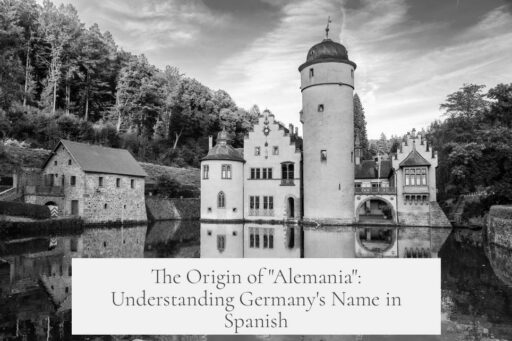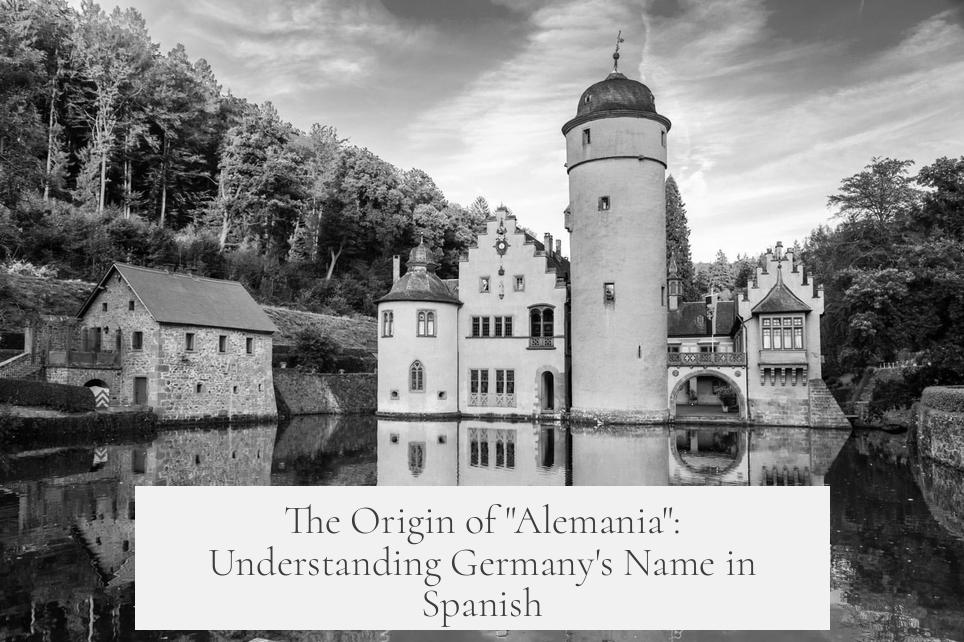Germany is called “Alemania” in Spanish because of the influence of the Roman Empire and the Alemanni tribe, which left a lasting mark on the Romance languages.
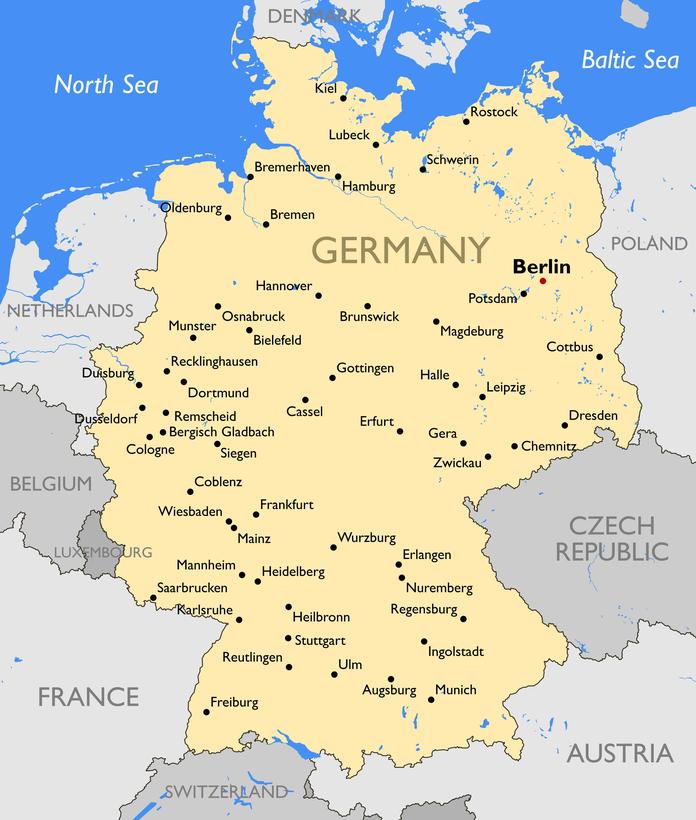
Spanish, like French and Portuguese, stems from Latin, the language of ancient Rome. The Romans encountered many Germanic tribes and used several terms to describe these peoples and their lands. Around the time of the Roman expansions near current Spain and France, they named the region inhabited by the Alemanni tribe as “Alamania.” This tribe lived close to the Roman borders, maintaining significant contact with the empire.
Because the Alemanni were the most prominent Germanic tribe near the Roman frontier, the name associated with them came to represent the larger Germanic area. Thus, in Romance languages, including Spanish, “Alemania” became the word for Germany.

The French word “Allemagne” shares this root. Since French claims descent from the Franks—a Germanic tribe that ruled Romanized Gaul—the French avoid calling modern Germany “Germania” to differentiate themselves ethnically. Instead, they used “Allemagne,” the name of the neighboring Alemanni tribe’s territory.
Over time, “Allemagne” influenced Spanish and other Romance languages, leading to “Alemania” as the standard name for Germany.
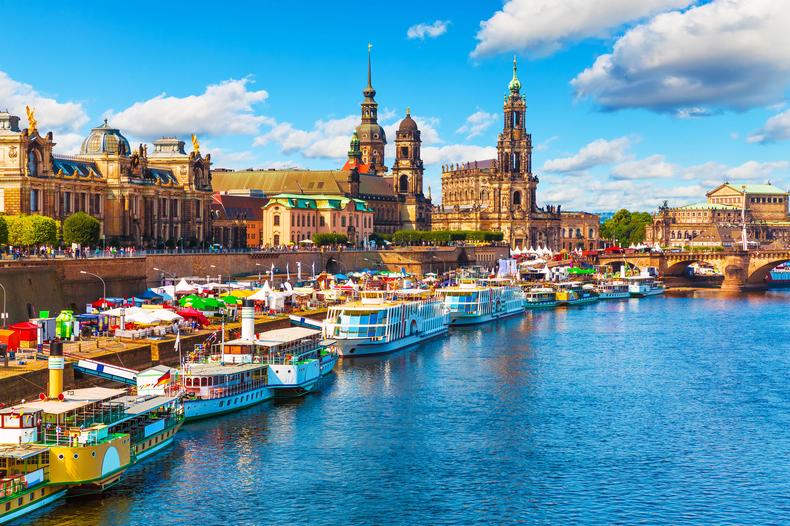
- Roman Latin is the root of Romance languages like Spanish.
- The Romans called the land of the Alemanni “Alamania.”
- Alemanni lived near Roman borders and had frequent contact.
- French “Allemagne” influenced Spanish “Alemania.”
- Names derive from tribes with close ties to Roman lands, not from the country as a whole.
These linguistic and historical links explain why Spain uses “Alemania” rather than a word derived directly from “Germania.” The term reflects the ancient tribe most familiar to Rome and its Latin descendants.
Why is Germany Called “Alemania” in Spanish?
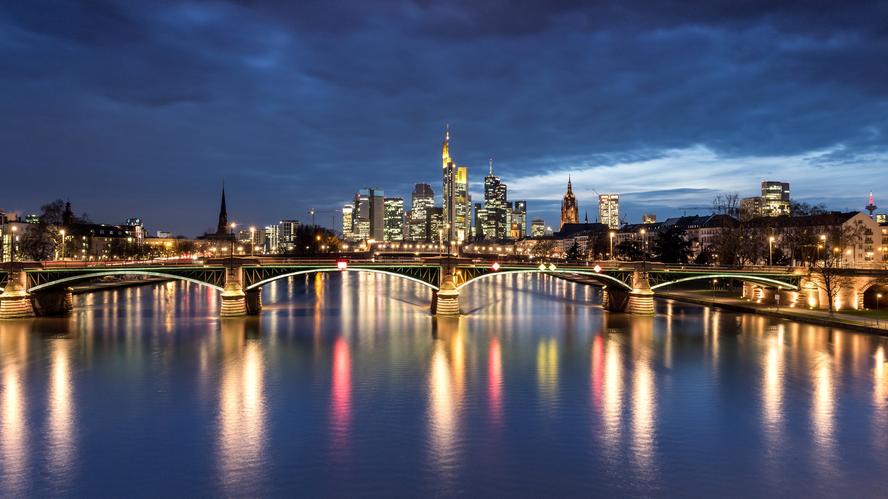
Simply put, Germany is called “Alemania” in Spanish because the name traces back to the Alemanni tribe—a Germanic group that had frequent contact with the Roman Empire and settled near its borders. But there’s much more to this story than just a tribal footnote.
The word “Alemania” embodies a fascinating intersection of history, language evolution, and cultural identity. If you’ve ever wondered why Spanish speakers call Germany “Alemania” while English speakers say “Germany” and Germans themselves say “Deutschland,” you’re about to get the full scoop.
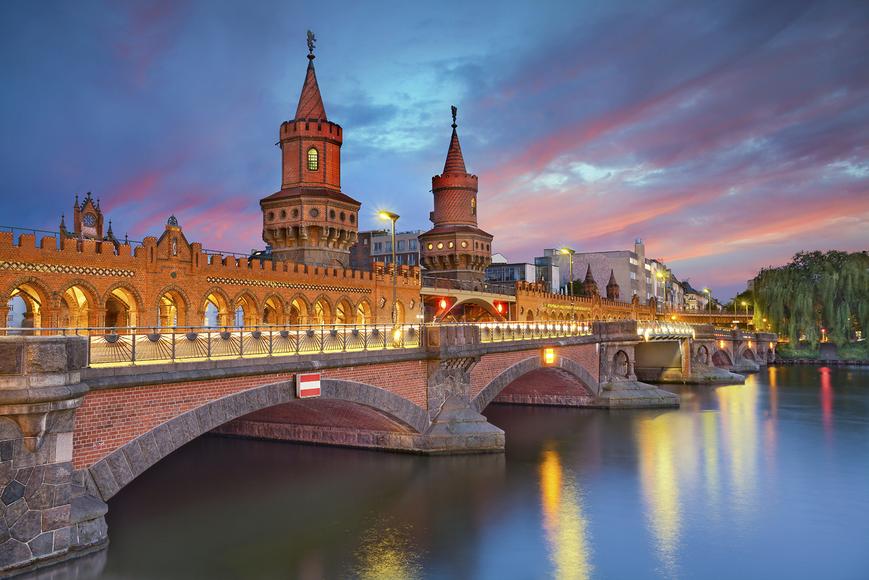
Grab a cup of coffee because this tale starts with Rome, tribes, and linguistic twists!
The Roman Roots: Why Romance Languages Matter
Spanish, French, Portuguese, Italian, and Romanian—these are the Romance languages. Their name gives it away: they all stem from Latin, the language of the Roman Empire.
When Rome expanded across Europe, it met many tribes and peoples. The Romans named many regions and groups they encountered, using those names as reference points that stuck in the languages descending from Latin.
So, the story of “Alemania” is tied directly to Latin-speaking Romans who needed a word to describe their northern neighbors beyond the Empire’s borders.
The Alemanni Tribe: Frontline Germanic Neighbors of Rome
Among the diverse Germanic tribes roaming that vast area known today as Germany, one group stood out to the Romans: the Alemanni. This tribe occupied lands just east of the Roman Empire’s frontier—primarily areas spanning today’s Alsace, Baden-Württemberg, Switzerland, and parts of Bavaria.
Because the Romans often met and battled the Alemanni, they came to use the term Alamania to refer broadly to the territory and people associated with this tribe.
This is a key reason Romance languages, including Spanish, use variants of “Alemania” to denote the entire country now known as Germany.
Other Germanic Groups and the Name “Germany”
On the flipside, the English term “Germany” comes from the Latin “Germania,” which itself harkens back to a word “Germanen.” But interestingly, “Germanen” originally referred to tribes on this side of the Rhine—specifically the Eburones, who lived in what is today’s Belgium.
Over time, the name “Germania” came to denote a larger region and peoples, forming the root of the English term “Germany.”
So while Spanish clings to the tribal name “Alemanni,” English leans on another historical term rooted in a separate Germanic group.
French Influence: The Link Between “Alemania” and “Allemagne”
We can’t talk about “Alemania” without tipping the hat to French. Spanish likely borrowed the term through French, where Germany is called “Allemagne.”
The Franks, a Germanic tribe themselves, ruled over Roman Gaul and became the successors of the Roman cultural and linguistic legacy there. They couldn’t call the entire Germanic world “Germans” since they were technically part of that group. Instead, the term “Alamanni” labeled a distinct subgroup near their border.
This resulted in the word “Allemagne” being extended to cover all of Germany, which then filtered into Spanish as “Alemania,” and similarly into Portuguese as “Alemanha.”
What About “Deutschland”?
Germans call their country “Deutschland,” which means “the land of the people who belong together.” The word “Deutsch” originally described people who belong to the community or nation—more about belonging than ethnic identity.
So while “Alemania” and “Germany” highlight outside perspectives, “Deutschland” reflects an internal identification rooted in shared culture and territory.
Fun Facts: Naming Conventions Across the Globe
- In English, the word “German” used to be “Alemain” until about the 16th century. The change happened as Dutch and German identities became clearer, and they moved away from the broader “Alemanni” label.
- Finnish and Estonian call Germans “Saxons,” referencing another Germanic tribe with strong historical influence—just as Spanish calls them after the Alemanni.
- Some Slavic languages call Germans “mute” or “foreigners,” because to Slavs, the Germanic languages sounded incomprehensible.
- Languages without early contact with Germany, like Chinese, Japanese, and Vietnamese, base their name for Germany on “Deutschland” or “Deutsch.”
Why Does This Matter Today?
Understanding why Germany is “Alemania” in Spanish opens a window into history and language—a reminder that our words carry stories. “Alemania” isn’t just a random name. It’s a legacy of Roman frontiers, tribal encounters, and linguistic evolution.
It’s fascinating how language preserves history in ways most don’t realize. Next time you hear “Alemania,” you’re hearing echoes of an ancient tribe that once shook hands (and swords) with the Roman Empire.
Practical Tip: Using Country Names in Different Languages
If you’re a language learner or traveler, knowing the local variations of country names can be a conversation starter or an icebreaker. Say “Alemania” in Spain or Latin America, and you instantly connect through language history.
Want to impress your friends? Mention that the Spanish term dates back to the Alemanni tribe and Roman influence. It turns a simple question into a fascinating chat!
Wrapping Up
So: Why is Germany called “Alemania” in Spanish? Because of the Roman Empire’s encounters with the Alemanni tribe living on the frontier, the influence of French language, and the roots of Spanish in Latin, which preserved that ancient tribal name as the country label.
This shows how language is a living history book. The names we use aren’t just words; they’re stories, connections, and cultural footprints left behind.
Feeling inspired? Wander through other country names! You might find a hidden tribe or empire behind each one, waiting to tell its tale.
Why is Germany called “Alemania” in Spanish?
Spanish uses “Alemania” because it derives from the name of the Alemanni tribe. This tribe lived near Roman territories and had frequent contact with the Roman Empire, influencing the name used for German lands.
Who were the Alemanni and why do they matter for the name?
The Alemanni were a Germanic tribe near the Roman Empire. Romans referred to their region as Alamania. This name spread in Romance languages, including Spanish, to designate all of Germany.
How did the Roman Empire influence the name “Alemania” in Spanish?
Romans named the Germanic tribes and areas around them. The Alemanni tribe bordered Roman lands, so their name became a reference point. Romance languages kept this name when referring to Germany.
Is the Spanish “Alemania” connected to the French word “Allemagne”?
Yes, Spanish likely borrowed “Alemania” from French “Allemagne.” Both come from the Alemanni tribe’s name, which was used widely in regions influenced by the Roman Empire.
Why don’t Romance languages use the word “Germania” for Germany?
Though “Germania” is Latin for Germany, many Romance languages use names based on tribes closer to their borders. The Alemanni tribe’s name was more familiar and thus became common in languages like Spanish and French.
